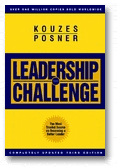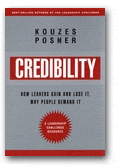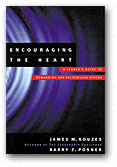
|
|
Leadership
is a relationship between those who aspire to lead and those who
chose to follow. Sometimes the relationship is one-to-one. Sometimes
it’s one-to-many. But regardless of whether the number is
one or one thousand, leadership is a relationship. What’s
been most striking is that we don’t get a different answer.
People keep sending the same message. They want leaders who are
honest, forward-looking, competent and inspiring. What this adds
up to is personal credibility. Credibility is still the foundation
of leadership. People
want to have faith and confidence in their leaders. They want to
believe that a leader’s word can be trusted, that a leader
is personally excited and enthusiastic about the direction in which
we are headed, and that a leader has the knowledge and skill to
lead. If people don’t believe in the messenger, they won’t
believe the message. But
somewhere along the way to the New Millennium notions of ethics,
morality, honesty, character and personal discipline came to be
viewed as quaint — at least by those from the me-first, free
agent school of corporate strategy. People got sucked into the idea
that leadership was all about extrinsic rewards, and they started
offering very creative ways to attract talent to the good life.
The intrinsic reasons for doing something important —really
caring about the people and the purpose — too often got lost
in the hyperbole. Certainly
the context of leadership has changed, but given what we’ve
all experienced, we’ve come to see how necessary it is to
be reminded of some fundamentals that do not change.
Teaching
people to use the tools of commerce is necessary but insufficient
to creating a healthy and prosperous society. The right tools in
the wrong hands invite evil ends. The more we study leadership,
the more we’re persuaded that leadership development is not
simply about “how to’s.” It’s also about
character development.
It’s
important to make this distinction, because ultimately everyone
of us must take personal responsibility for what we do. Actions
have consequences, and we all have to account for our own. What
organizations do is create cultures. Culture is the organizational
equivalent of a person’s character. The behavior that is modeled
becomes the behavior that is followed. This is good news and bad
news. Good news because solid cultures can be built around ethical
behavior. The bad news is that cultures can also be built around
the opposite, at least for a while. It really does matter what you
choose to believe in.
Whether
you like these changes or not, they just prove one thing: our entire
capitalist system is based on trust. It’s not based on an
investment model that’s taught in business school. It’s
not based on the price earnings ratio. It’s not based on an
income statement or a balance sheet. It’s not based on any
of these rational concepts, and it’s not based on the numbers.
It’s based on whether people believe in the numbers and in
the people who are supplying them. If people don’t trust those
who handle their money, their livelihoods, and their lives they’ll
just refuse to participate. We’re
all asking ourselves, When will this end? We can’t give you
a date certain, but we can tell you that it’ll only come when
people feel they can once again trust the system and the people
in it.
Much
as compelling words are essential to uplifting spirits, exemplary
leaders know that constituents are moved by deeds. They expect leaders
to show up, to pay attention, and to participate directly in the
process of getting extraordinary things done. Leaders take every
opportunity to show others by their own example that they are deeply
committed to the aspirations they espouse. Leaders
are judged by how they spend their time, how they react to critical
incidents, the stories they tell, the questions they ask, the language
and symbols they choose, and the measures they use. Nothing fuels
the fires of cynicism more than hypocrisy, and leaders will need
to be constantly vigilant about aligning what they practice with
what they preach. If you dream of leaving a legacy then you’d
better heed the Golden Rule of Leadership: DWYSYWD: Do What You
Say You Will Do.
Leadership
matters. Success in initiating or responding to change, however,
is inextricably linked to the credibility of those leading the efforts.
Constituents will become willingly involved to the extent that they
believe in those sponsoring the change. It is wise, therefore, for
leaders to begin every significant change with a “credit check.”
It’s not just “Do my constituents believe that the new
CRM system will improve our performance?” Or, “Do they
believe that this risky policy is for the greater good?” It’s
also “Do they believe in me and my ability to lead this effort?” Even
so, unquestioned integrity is not enough. Leaders can’t do
it alone. Neither can companies, communities, or countries. Everyone
— leaders and constituents alike — shares responsibility
for getting extraordinary things done. Leaders need constituents’
energetic involvement as much as the constituents need leader’s
boldness of vision and courage of conviction. Leaders also need
understanding. Responding to the demands of highly diverse populations
is a social challenge and a personal struggle. Respect must run
both ways. Leadership should be everyone’s business. By making leadership our business and not just their business, we all contribute to the renewal of mutual trust and understanding. By making leadership about us and not about them, we all take responsibility for the doing what we say we will do. In this process we all become more credible.
Portions of this article are adapted from Credibility: How Leaders Gain and Lose It, Why People Demand It. (San Francisco: Jossey-Bass, 2003. Copyright © 2003. James. M. Kouzes and Barry Z. Posner. All rights reserved. Books by Jim
Kouzes and Barry Posner:
|
||||||||||||||
- Home Page - About
ILA - Articles - Leadership Journal - Programs & Services
- Success Stories -
- Assessments / Instruments -
Continuing Development - Leadership
Model - Partners - Contact
Us -
All materials Copyright © 1999-2007 International Leadership Associates. All rights reserved.
No portion of this publication may be reproduced in any form or
by any means without written permission of International Leadership
Associates.




